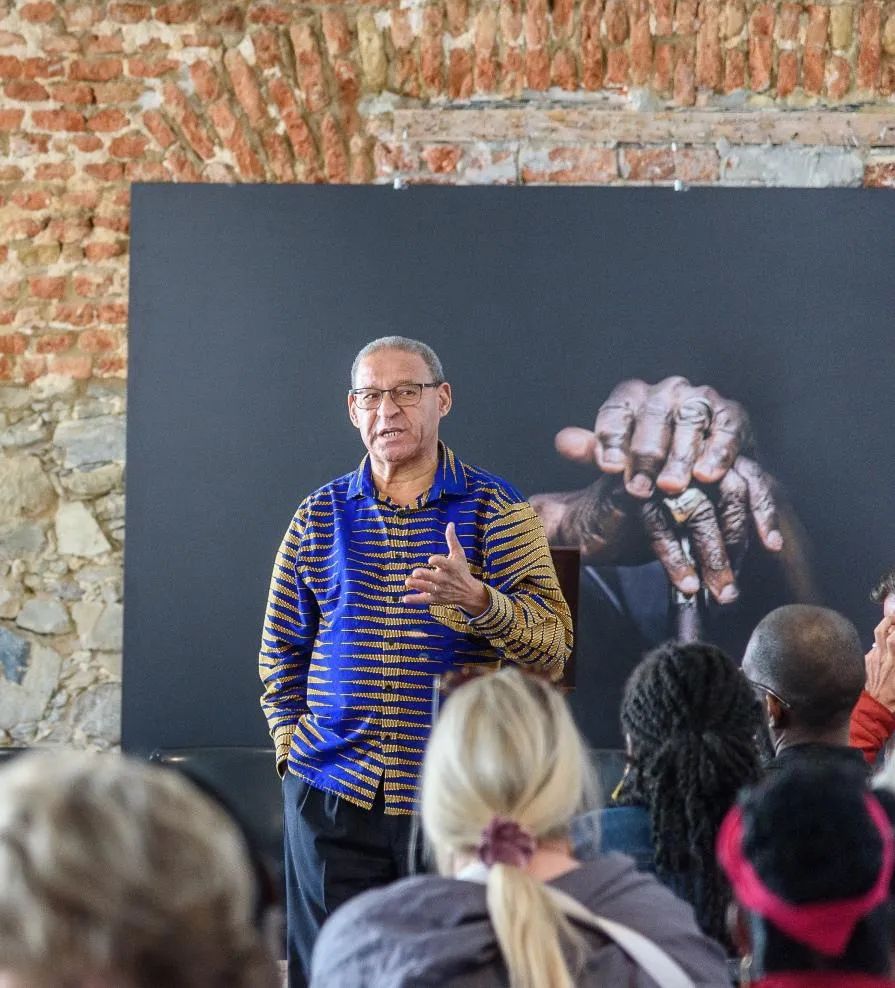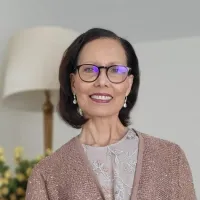Solid Ground Topics
"Building Leadership, Purpose, and Healing on Unshakable Truth"

Part 5 & 6: Emotions, Biases, and Validation
Pictured is Dr. Alan Boesak. In the background are the hands of Bishop Tutu. Taken at the Bishop Desmond Tutu museum in South Africa.
This blog post continues my blog series ‘Reflections on South Africa.’ Because Part 5 of the eight-part series is short, I combined it with Part 6.
The original questions I asked and answered during that trip in 2022 are below. Why is racial healing needed, particularly at this undefinable epoch? How can racial healing and leadership, a potent combination, rise to meet some of the unforeseen challenges we will likely face in the next several years?
PART 5: Emotions and Biases
The last leadership lesson for me has to do with the subject of emotions and biases and their impact on our self-awareness. Today, becoming culturally aware and having the intentionality needed to grow in this area is paramount to being a great leader.
Culturally Aware
We no longer must travel overseas to become immersed in multiculturalism. However, on a deeper level, being culturally aware of others is only a start.
Our Biases
Learning about our biases in multiculturalism is also a requirement if we aspire to be authentic and honest leaders who lead from a deeper place of honor and respect for others. The question is, how do we begin the learning process about others who are different from us culturally or otherwise?
PART 6: Validation
Profound Impact
In South Africa, we spent a day visiting Bishop Desmond Tutu's Museum, and we heard from Dr. Alan Boesak and two of Bishop Tutu's mentees, Edwin and Rennie. My Christ-centered perspectives regarding racial justice and my fellow man/woman were profoundly impacted by listening to the speakers and touring the museum films, displays, and pictures.
Controversial Project
I had selected racial healing and reconciliation in the Church as my doctoral project the previous semester. However, upon arriving in South Africa, I wasn't sure I could follow through on such a controversial project. However, every speaker and every place we visited served to validate the need for this body of work. Most speakers had lived or fought through South Africa's Apartheid, and to hear that racial justice and healing is a mandate for the Church was more than inspiring.
Three Call-To-Action Mandates
Dr. Alan said three things that pierced my thinking: he talked about racial justice as a divine imperative, he said we are Christian Freedom Fighters, and lastly, that the way to victory is always the way of the Church (I'm going to add - the way of Christ). They have become my personal Call-To-Action mandates.
The Church Has Lost Its Voice
I'll end this section with further insights from Pastor Zondi, who continued cementing my vision and understanding of the racial and injustice problems and opportunities we face. He stated that when the Church stops asking questions - when the Church stops raising its voice, it precipitates a leadership bankruptcy. And when the Church goes to the government, it is the day we lose our voice because you never bite the hand that feeds you. It is a simple analogy yet profound. Closely related is when the church votes for corruption, it also silences its prophetic voice. I've seen all of these in action within the Church - but could never articulate the theological and Christ-centered implications meaningfully. Now, I have a frame of reference - a compass point to anchor myself.
I was tempted to subtitle this section; The Church Has Lost Its Prophetic Voice. While I believe that to be true, there has been a significant increase in false prophets who are misleading many followers of Christ. Unfortunately, these false prophets (and pastors) have been the catalyst that has caused the Church to yield its reliance on God’s sovereignty to a political system. As a result, it has succumbed to a form of idolatry that we see manifesting in America and other parts of the world. The question then, what must happen to wake those who have succumbed to this idolatry?
Submit Cultural Views
The last point from his discussion that spoke to me was about the tension between culture and our Biblical worldview. As a church, we are to submit our cultural views to scripture; failing to do so is always a problem. This is a simple statement; however, it requires an unyielding devotion and commitment to the way of Christ.
Epilogue
There are no easy answers to the complex problems we face today, especially those dealing with racial healing and reconciliation. But does that suggest we do nothing? Should we take the position that because there is a mixing of Blacks and Whites, i.e. resulting in mixed children, that this problem will eventually work itself out? I think that doing nothing is unbiblical. Why? In Colossians NLT it states:
14 Above all, clothe yourselves with love, which binds us all together in perfect harmony. 15 And let the peace that comes from Christ rule in your hearts. For as members of one body, you are called to live in peace. And always be thankful.
Perfect harmony. The Church in America is so far from the mark. Until the racial hatred is addressed in the Church with honest conversations that foster healing and repentance there can be no sitting on the sidelines. How can we demonstrate the love of Christ and represent Him without genuine love for one another? Join me and become a Christian Freedom Fighter. Fight the good fight by tackling the difficult conversation on racism in the Church.

